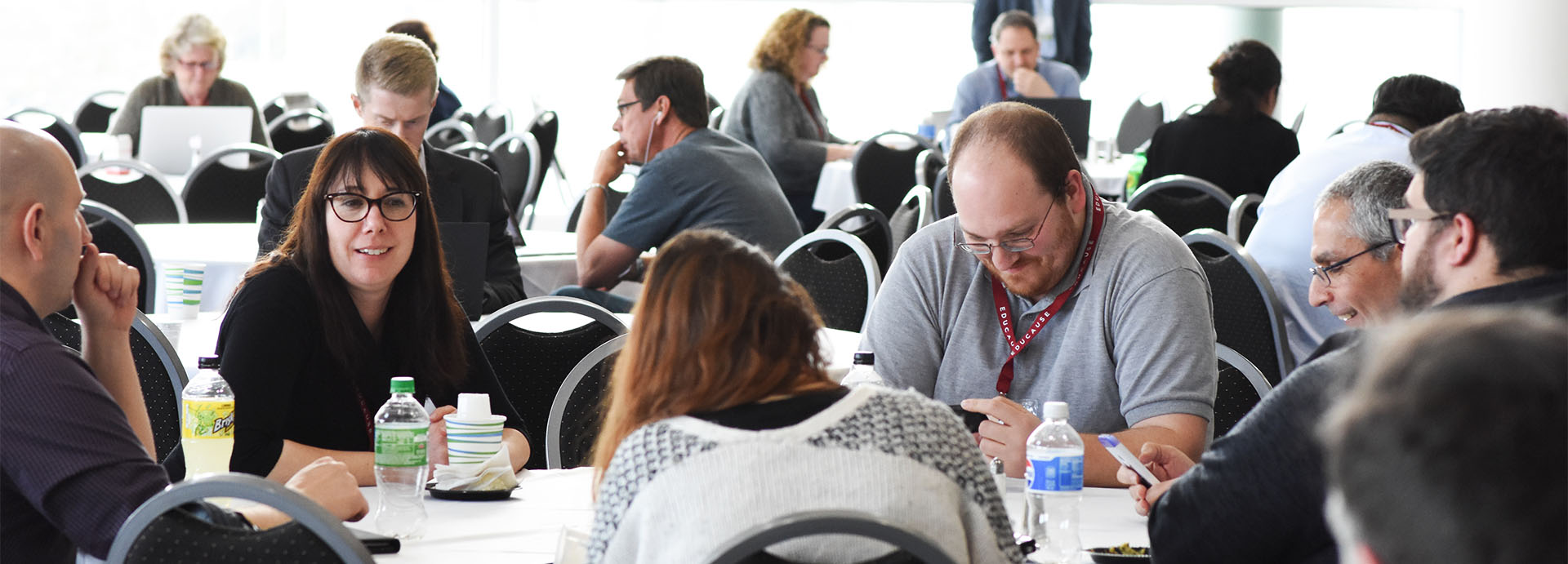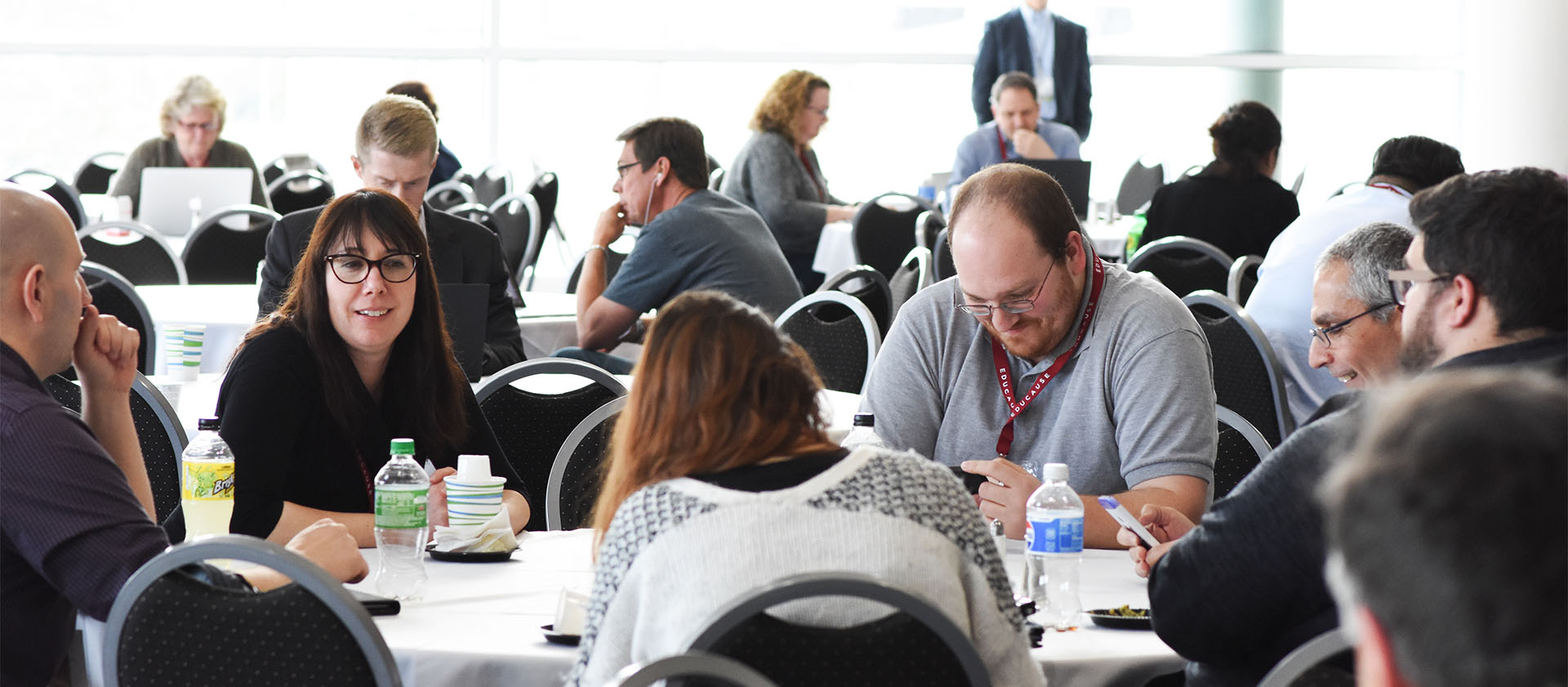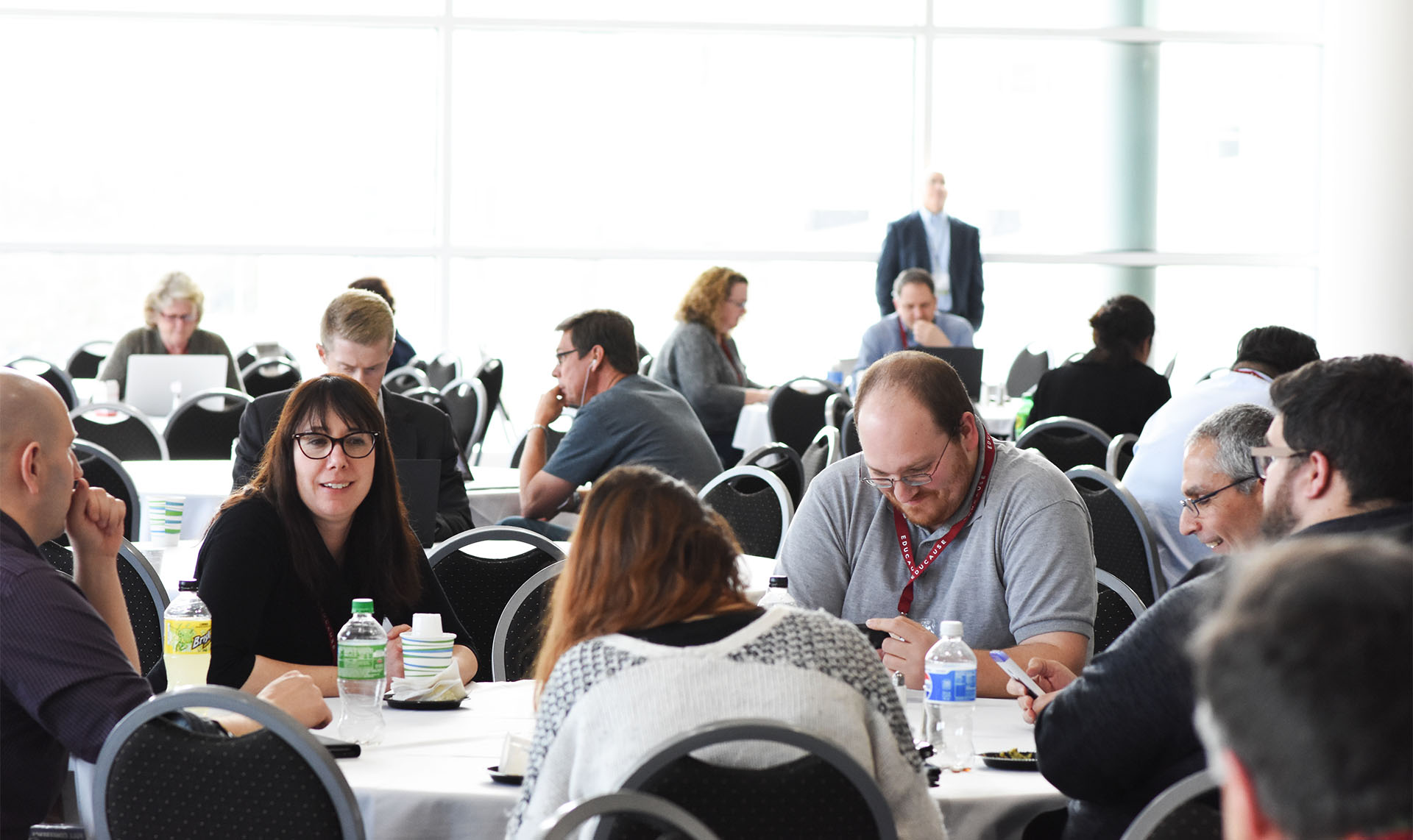- Overview
- Speakers
- Agenda
Thought Partner Program: Advancing Digital Accessibility in Higher Education
THIS EVENT IS FILLED
Where: Virtual
When:
Thursday, November 21, 2024, 1:00 p.m.-2:30 p.m.
Thursday, December 5, 2024, 1:00 p.m.-2:30 p.m.
Thrusday, December 12, 2024, 1:00 p.m.-2:30 p.m.
Note: Zoom login instructions will be sent the day prior. If you have not received login instructions by 4:00pm the day before the webinar, please check your spam folder, if you still have not received the login details please email nercomp@nercomp.org.
Workshop Organizers: Sarah Walkowiak of Wentworth Institute of Technology
Registration Fee:
NERCOMP Member: Free
Non-Member: $45
Event Overview
The NERCOMP Thought Partner Program fosters collaborative learning and discussion among members, focusing on digital accessibility in higher education. This three-part series explores the evolving landscape of accessibility, from creating accessible digital content to adapting complex course materials while navigating compliance with legal regulations like ADA and HHS. Through informal, discussion-focused sessions led by experts and peers, participants will gain practical insights into improving digital accessibility across their institutions. Open to anyone with an interest in accessibility, this series encourages open dialogue, idea-sharing, and professional networking in a supportive environment.
Learning Outcomes
Participants will:
- Describe best practices for enhancing digital accessibility in higher education.
- Share tools, strategies, and solutions with peers to tackle common accessibility challenges.
- Identify 1-2 areas for improvement in your own digital accessibility efforts.
- Gain clarity on the latest legal requirements for digital accessibility compliance under ADA and HHS regulations.
- Explore approaches to making digital STEM content more accessible to all learners.
Note: These sessions will not be recorded. In order to be able to prioritize group connection and experience; participants will have the option to turn cameras and microphones on during the sessions or respond in the chat. (Why Keeping the Camera Off Creates Inclusive Virtual Meetings)”
Registration Cancellation Policy:
By clicking on the "Order Now" button, you are indicating a commitment to attend and will be held responsible for the registration fee. Your fee can be refunded if you notify us of a cancellation at least 1 day prior to the event via email to nercomp@nercomp.org.
Accessibility
NERCOMP strives to make its online offerings and In-person workshops accessible for all registrants. Please contact us should you have an accessibility need. We've worked to provide resources that are accessible to as many people as possible, and if you encounter any issues while attending our events, please contact us at accessibility@nercomp.org or at 860-345-2081 to request assistance.

Jeffrey Kuan
Jeffrey Kuan is an Assistant Professor of Mathematics at Texas A&M; he is also the owner and founder of Tailor Swift Bot, an accessibility company supporting institutes of higher education (unaffiliated with Texas A&M). His expertise is in helping instructors and authors efficiently create WCAG2.1AA compliant mathematical PDFs. He has received federal funding for some of his accessibility work, and has been invited to present on accessibility at the Joint Math Meetings, American Mathematical Society, and TeX Users Group. He also has CPACC certification.
Megan Grandmont-Melendy (she/her)
Megan Grandmont-Melendy is a Technology Trainer and Communication Specialist at Wentworth University of Technology, where she designs, develops, and delivers trainings and communications about technology for faculty and staff. As someone who produces digital content for an entire organization, Megan takes seriously the responsibility to combat what disability scholar Ashley Shew calls “technoableism.” Her goal is to provide digital learning materials and environments that are accessible to all, a topic on which she is always learning more.
Prior to working at Wentworth, Megan designed and delivered impactful learning programs across diverse formats and industries, including K-12 education and healthcare. She has her Master’s in both Teaching and English from Salem State University and a Bachelor’s in English from Boston College.

Judith Risch (she/her/hers)
Judith Risch, J.D., Ph.D., is the Title IX & Equity Access Services Special Advisor at Grand River Solutions. Judy brings over two decades of invaluable experience from her tenure at the Office for Civil Rights (OCR) in the U.S. Department of Education. Judy is nationally recognized as a foremost expert in digital accessibility, having served as a senior attorney at the Department of Education, where she co-led the Office for Civil Rights National Digital Accessibility Team. Her role involved overseeing a team of attorneys and investigators across twelve regional offices, enforcing digital accessibility policies and advising educational institutions and business leaders on compliance with federal disability discrimination laws.
While at OCR, Judy provided expert technical guidance during the development of the new ADA Title II amendments that cover digital accessibility. She also contributed her expertise to updating the 2024 Section 504 Regulations regarding digital accessibility for the Department of Health and Human Services, Office for Civil Rights. Judy regularly advises and presents to educational institutions and business leaders throughout the country about how to effectively comply with federal civil rights laws, especially those that relate to disability discrimination, access, and technology.

Sara Shunkwiler
Sara Shunkwiler is an instructional designer at Johns Hopkins University Whiting School of Engineering and Adjunct Faculty at JHU School of Education where she is a passionate advocate for STEM equity and effective engineering education. A disabled engineer, K-12 and Higher Ed STEM educator, Sara seeks to raise awareness of disability as a valued form of diversity and the challenges of disability disclosure. She is a 2024 Teach Access Fellow and frequent presenter on equitable access in STEM, math accessibility, and UDL as a social justice tool. Challenged by another engineering faculty to own her disability story, she seeks to be a role model empowering STEM colleagues and students as advocates and allies.

Katherine Springer (she, her)
Katherine Springer is a Course Support Specialist in the Center for Teaching and Learning Design in the Whiting School of Engineering at Johns Hopkins University. She has seven years of experience in online higher education. Her focuses include promoting accessibility best practices and faculty development. Within her role at the Whiting School of Engineering, accessible math has become the main focus in her accessibility research and training.
Lori Strauss
Lori Strauss is the Website Director at Wentworth Institute of Technology. With over two decades of experience in digital communications, she leads Wentworth's web presence, ensuring a seamless and informative experience for all users.
Previously, Lori has contributed to the digital strategies of higher education and educational non-profit institutions including MIT, Harvard, Teachers College - Columbia University, and the Museum of Science. Beyond website management, Lori is an advocate for accessibility and actively participates in Wentworth's Digital Accessibility Sub-Committee and AI Steering Committee.
Holding a Master's of Education in Higher Education Management from the University of Pennsylvania, Lori brings a unique blend of academic knowledge and practical skills to her role. When she's not shaping Wentworth's digital landscape, Lori enjoys storytelling and comedy, performing in the Boston area.
Sarah Walkowiak
Sarah Walkowiak is an Instructional Designer and member of the Digital Accessibility Sub-Committee at Wentworth Institute of Technology with a wealth of experience in course design, development, delivery, and assessment in online, hybrid and face-to-face teaching environments. Digital accessibility and learner agency are integral parts of her course development work.
Sarah has over 15 years of experience in higher education and K-12 institutions in instructional design, project lead, faculty development, academic technology, and privacy roles.
Sarah has been involved with NERCOMP as a Professional Development Organizer, presenter, and mentor. Sarah earned a Bachelor of Science from Worcester Polytechnic Institute, a Master of Science from Clark University, and an Advanced Certificate in Cybersecurity from Massachusetts Bay Community College. When she’s not keeping up with current academic technology, Sarah enjoys working with retro computers, primarily the Apple II and other 8-bit era machines or emulators.

Misty Woodbury
Misty is excited about the intersection of technology and learning and is passionate about helping to create engaging, equitable, and inclusive learning experiences. She has an extensive background in instruction, course and curriculum development, learning technology, and faculty development. Misty earned her BS and MA in English from Northeastern University and an Ed.D from Johns Hopkins University. When she’s not working, she makes time for baking, writing ghost stories, and herding cats.
November 21, 2024: Getting Started with Digital Accessibility
1:00 p.m.-2:30 p.m. EST
Is your campus or department starting out on your journey toward improving Digital Accessibility? In this conversation, we will discuss the basics of digital accessibility for your institution’s public-facing website and course materials, where to begin, and which stakeholders need to be involved. Our speakers will provide a brief introduction to digital accessibility. Then, we’ll open the conversation by sharing some of our efforts and inviting others to share their questions and expertise from other institutions in a group discussion.
This session will require a Zoom account, if you do not have one, you may create one for free at zoom.us. Zoom automated live transcription will be available.
Note: To encourage open and candid discussions, these sessions will not be recorded. Participants will have the option to turn cameras and microphones on during the sessions or respond in the chat. (Why Keeping the Camera Off Creates Inclusive Virtual Meetings)
Objectives:
-Share ideas and strategies with other participants
-Network with professionals from other institutions
-Identify 1-2 areas to explore for improving Digital Accessibility in your work
Speakers:
Megan Grandmont-Melendy, Technology Trainer and Communication Specialist, Wentworth Institute of Technology
Lori Strauss, Website Director, Wentworth Institute of Technology
Sarah Walkowiak, Instructional Designer, Wentworth Institute of Technology
Misty Woodbury, Interim Director, Teaching & Learning Collaborative, Wentworth Institute of Technology
December 5, 2024: Demystifying Legal Requirements and Compliance for Digital Accessibility
1:00 p.m-2:30 p.m EST
Recent updates to the Americans with Disabilities Act(ADA) Title II and Health and Human Services(HHS)§504 regulations include web accessibility requirements that are applicable to public institutions and potentially other institutions that receive federal funding. This session will include an overview clarifying how these regulations apply to higher education with extended time for discussion and questions at the end.
This session will require a Zoom account, if you do not have one, you may create one for free at zoom.us. Zoom automated live transcription will be available.
Note: To encourage open and candid discussions, these sessions will not be recorded. Participants will have the option to turn cameras and microphones on during the sessions or respond in the chat. (Why Keeping the Camera Off Creates Inclusive Virtual Meetings)
Objectives:
-Share ideas and strategies with other participants
-Network with professionals from other institutions
-Describe requirements and recent changes to digital accessibility legal compliance for the Americans with Disabilities Act (ADA) and Health and Human Services (HHS) regulations that affect higher education
Speaker:
Judith Risch (she/her/hers), Title IX & Equity Access Services Special Advisor, Grand River Solutions
December 12, 2024: Digital Accessibility Strategies for STEM-focused Course Materials
1:00 p.m.-2:30 p.m. EST
In this session, we will discuss the importance of disability inclusion in STEM and how we approach digital accessibility for technical STEM content in a mini-panel style of short presentations followed by Q&A. We will share efforts to create a culture of inclusion that values disability as diversity and accessibility as a mindset, as well as math accessibility tools and challenges to make math content fully accessible. The discussion segment includes time for those who would like to share and discuss successes and challenges from their institution with the group.
This session will require a Zoom account, if you do not have one, you may create one for free at zoom.us. Zoom automated live transcription will be available.
Note: To encourage open and candid discussions, these sessions will not be recorded. Participants will have the option to turn cameras and microphones on during the sessions or respond in the chat. (Why Keeping the Camera Off Creates Inclusive Virtual Meetings)
Objectives:
-Share ideas and strategies with other participants
-Network with professionals from other institutions
-Identify challenges and potential solutions for making digital STEM course content accessible
Speakers:
Jeffrey Kuan, Owner and Founder @Tailor Swift Bot
Sara Shunkwiler, Instructional Designer | Disability Inclusion Advocate, Whiting School of Engineering, Johns Hopkins University
Katherine Springer (she, her), Course Support Specialist, Center for Learning Design and Technology, Whiting School of Engineering, Johns Hopkins University





